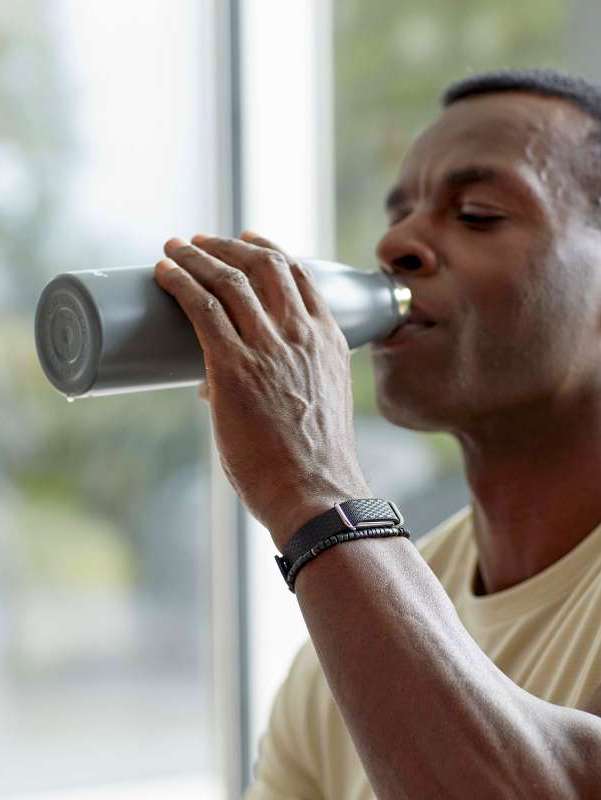One of the most important yet often overlooked benefits of staying properly hydrated is its impact on blood pressure regulation. Blood pressure, the force exerted by circulating blood on the walls of blood vessels, is a key health indicator. Imbalances can lead to long-term health complications.
This article explains the relationship between hydration and blood pressure, and how drinking water can influence blood pressure levels.
How does water affect blood pressure?
Water is essential for life, playing a crucial role in maintaining the balance and function of every cell in the body. Its relationship with blood pressure is complex, influencing it in several ways.
Ways drinking water may raise blood pressure
Blood volume increases
Although it might seem counterintuitive, drinking water can sometimes temporarily elevate blood pressure. This typically occurs if someone is significantly dehydrated. For example, if a person drinks a large amount of water in a short period after being dehydrated, the blood volume can increase, causing a short-term rise in blood pressure. This effect is temporary, as the body’s regulatory systems quickly restore balance.
Dehydration response
Dehydration can cause blood pressure to drop. In response, the body releases hormones such as vasopressin (an antidiuretic hormone), which constricts blood vessels and reduces urine output to conserve water. This vasoconstriction may cause a temporary increase in blood pressure to ensure adequate blood flow to vital organs. If water is consumed at this point, blood pressure may rise further for a short period.
Ways drinking water could lower blood pressure
On the other hand, maintaining good hydration is important for supporting healthy blood pressure over the long term.
- Improved kidney function: The kidneys regulate blood pressure by managing fluid balance and filtering out excess sodium and waste. Drinking enough water supports kidney function, allowing sodium and waste to be efficiently removed, which may help lower blood pressure.
- Better blood vessel function: Hydration helps keep blood at a healthy viscosity (thickness). When dehydrated, blood can become thicker, making the heart work harder and potentially increasing blood pressure. Staying hydrated supports smoother blood flow and reduces strain on the cardiovascular system.
- Electrolyte balance: Adequate water intake helps maintain the electrolyte balance required for healthy blood pressure.
- Support for the autonomic nervous system: This system, which controls functions such as heartbeat and blood vessel constriction, is sensitive to hydration levels. Proper hydration supports its regulation of blood pressure.
Get instant access to expert advice and tips for accurate blood pressure monitoring. Subscribe to our newsletter today!
Will my blood pressure go down if I drink more water?
The relationship between water intake and blood pressure isn’t simple. Factors such as diet, lifestyle, and underlying health conditions all play a role. However, for many people, increasing water intake (especially if it has been too low) can contribute to better blood pressure levels over time.
Hydration is best viewed as part of a broader approach to cardiovascular health, which also includes a balanced diet, regular physical activity, and stress management.
How much water do you need to support healthy blood pressure?
Water needs vary between individuals and are influenced by factors such as age, body size, activity levels, and climate. In Australia, the National Health and Medical Research Council (NHMRC) recommends an adequate daily fluid intake of around 2.6 litres for men and 2.1 litres for women, from both drinks and foods. These requirements may be higher in hot weather or with vigorous exercise.
A simple way to monitor hydration is to drink when thirsty and check urine colour – pale yellow usually indicates good hydration. It’s also important not to overhydrate, as excessive water intake can be harmful.
Key takeaway
Water is not a cure for high blood pressure, but staying well hydrated is an important part of a healthy lifestyle that supports long-term cardiovascular health. If you have concerns about your blood pressure or are considering lifestyle changes, speak with your GP or a qualified health professional.
Disclaimer: This information is general in nature and is not a substitute for medical advice. Always consult your GP or another qualified health professional for advice specific to your health needs.
Sources
Better Health Channel (Vic Gov). Water – a vital nutrient. https://www.betterhealth.vic.gov.au/health/healthyliving/water-a-vital-nutrient (Accessed September 2025)
Australian Government Department of Health. Water and your health. https://www.eatforhealth.gov.au/sites/default/files/2022-04/n35-water_0.pdf (Accessed September 2025)
National Health and Medical Research Council. Nutrient reference values for Australia and New Zealand: Water. https://www.nrv.gov.au/nutrients/water (Accessed September 2025)
S. Iqbal, N. Klammer, C. Ekmekcioglu (2019). The Effect of Electrolytes on Blood Pressure: A Brief Summary of Meta-Analyses.Nutrients, 2019, 11 (6), 1362. https://doi.org/10.3390/nu11061362






